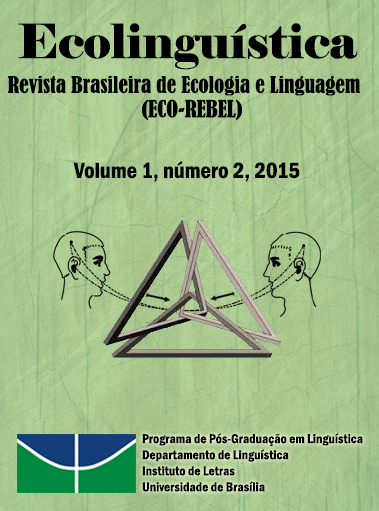O tao da linguagem: semelhanças entre linguística, construtivismo social e misticismo
Mots-clés :
Língua; Semântica; Construtivismo Social; Taoísmo; Zen-Budismo.Résumé
O principal objetivo desta artigo é mostrar que a sociologia e a linguística apresentam ideias semelhantes à s da filosofia oriental, que também serão discutidas neste trabalho. Além disso, procurar-se-á mostrar que tais similaridades também ocorrem em outras disciplinas, com destaque para a física moderna, conforme exposto em Capra (1999, 1982), bem como que a exploração dessas similaridades e uma possível síntese de tradições são mais úteis para a linguística, e demais ciências, do que a procura de pontos dessemelhantes.
Téléchargements
Références
BARTHES, R. (1972) Mythologies (translated, original 1957). London: Vintage Berlin, Brent and D Breedlove and P Raven (1974) Principles of Tzeltal Plant Classification. New York: Academic Press
BOURDIEU, P. (1991) Language and Symbolic Power (translated, original 1982). Mass.: Harvard University Press
BURR, V. (1995) An Introduction to Social Constructionism. London: Routledge
CANN, R. (1993) Formal Semantics: An introduction. Cambridge University Press
CAPRA, F. (1982) The Turning Point: Science, society and the rising culture. London: Harper Collins
CAPRA, F. (1999) The Tao of Physics: An exploration of the parallels between modern physics and Eastern mysticism (4th edition, 1st edition published 1975). Boston: Shambala
CHUANG, T. (2001) Teachings and sayings of Chuang Tzu (translation, original around 300BCE) New York: Dover
FAIRCLOUGH, N. (1989) Language and Power. London: Longman
FAIRCLOUGH, N. (1992) Discourse and Social Change. Cambridge: Polity Press
FOWLER, R. (1991) Language in the News: Discourse and Ideology in the Press. London: Routledge
GERGEN, K. (1999) An Invitation to Social Construction. London: Sage
GRIGG, R. (1994) The Tao of Zen. Boston: Alva Press
HACKING, I. (1999) The Social Construction of What? Mass.: Harvard University Press
HAGEN, S. (1997) Buddhism Plain and Simple. New York: Broadway Books
HAKUIN, Z. (1996) Zen Words for the Heart: Hakuin's commentary on the Heart Sutra (translated by Norman Waddell, original 1744). London: Shambala
HANH, T. N. (1988) The Heart of Understanding: commentaries on the Prajñaparamita Heart Sutra. Berkeley: Parallax
HARADA, S. (1993) The essence of Zen: Dharma talks given in Europe and America. Tokyo: Kodansha
HUANG, A. (1998) The complete I Ching. Rochester: Inner Traditions
LAKOFF, G. ; JOHNSON, M. (1999) Philosophy in the Flesh: The Embodied Mind and its Challenge to Western Thought. New York: Basic Books
LAO, T. (1997) Tao Te Ching (translated, original around 400 BCE). Herts: Wordsworth
MCPHAIL, M. (1996) Zen in the art of Rhetoric: an inquiry into coherence. New York: State University of New York Press
OLSON, C. (2000) Zen and the Art of Postmodern Philosophy. New York: State University of New York Press
POTTER, J. (1996) Representing Reality: Discourse, Rhetoric and Social Construction. London: Sage.
ROSCH, E. (1973), 'On the internal structure of perceptual and semantic categories' In: MOORE, T. ed., Cognitive development and the acquisition of language. London: Academic Press, 111-144
ROSCH, E. (1975) 'Cognitive representations of semantic categories'. Journal of experimental psychology, general 104, 193-233
STIBBE (2001) 'Semantic classification and ideology' Journal of Chikushi Jogakuen University. 13:125-146
SUZUKI, D. T. (1964) An Introduction to Zen Buddhism. New York: Grove Press
SUZUKI, D. T. (1970) Zen and Japanese Culture. NJ: Princeton University Press
VAN DIJK, T. (1993) ‘Principles of Critical Discourse Analysis’ Discourse and Society, 4(2): 249-283
VAN DIJK, T. (1997) ‘Discourse as Interaction in Society’ In: VAN DIJK, T.(ed.) Discourse as Social Interaction. pp1-37. London: Sage
WODAK, R.; MEYER, M. (2001) Methods of Critical Discourse Analysis. London: Sage WONG, E. (1995) Lieh-tzu: A Taoist guide to practical living (translation, original 400 BCE). London: Shambala
WRIGHT, D. (1992) 'Rethinking Transcendence: The role of language in Zen experience' Philosophy East and West, 42:1:pp113-139.
Téléchargements
Publié-e
Comment citer
Numéro
Rubrique
Licence
Autores que publicam nesta revista concordam com os seguintes termos:
Autores mantêm os direitos autorais e concedem à revista o direito de primeira publicação, sendo o trabalho simultaneamente licenciado sob a Creative Commons Attribution License o que permite o compartilhamento do trabalho com reconhecimento da autoria do trabalho e publicação inicial nesta revista.
Autores têm autorização para assumir contratos adicionais separadamente, para distribuição não exclusiva da versão do trabalho publicada nesta revista (ex.: publicar em repositório institucional ou como capítulo de livro), com reconhecimento de autoria e publicação inicial nesta revista.
Autores têm permissão e são estimulados a publicar e distribuir seu trabalho online (ex.: em repositórios institucionais ou na sua página pessoal) a qualquer ponto antes ou durante o processo editorial, já que isso pode gerar alterações produtivas, bem como aumentar o impacto e a citação do trabalho publicado (Veja O Efeito do Acesso Livre).



3.png)



